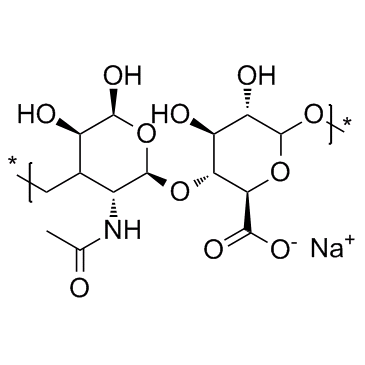
Sodium Hyaluronate
CAS No. 9067-32-7
Sodium Hyaluronate ( Hyaluronic acid sodium salt )
产品货号. M19838 CAS No. 9067-32-7
透明质酸 (HA) 是一种阴离子、非硫酸化糖胺聚糖,广泛分布于结缔组织、上皮组织和神经组织中。它在糖胺聚糖中的独特之处在于它是非硫酸化的,在质膜而不是高尔基体中形成,并且可以非常大,其分子量通常达到数百万。
纯度: >98% (HPLC)
 COA
COA
 Datasheet
Datasheet
 HNMR
HNMR
 HPLC
HPLC
 MSDS
MSDS
 Handing Instructions
Handing Instructions
| 规格 | 价格/人民币 | 库存 | 数量 |
| 50MG | ¥429 | 有现货 |


|
| 100MG | ¥583 | 有现货 |


|
| 200MG | ¥721 | 有现货 |


|
| 500MG | ¥1215 | 有现货 |


|
| 1G | ¥1531 | 有现货 |


|
生物学信息
-
产品名称Sodium Hyaluronate
-
注意事项本公司产品仅用于科研实验,不得用于人体或动物的临床与诊断
-
产品简述透明质酸 (HA) 是一种阴离子、非硫酸化糖胺聚糖,广泛分布于结缔组织、上皮组织和神经组织中。它在糖胺聚糖中的独特之处在于它是非硫酸化的,在质膜而不是高尔基体中形成,并且可以非常大,其分子量通常达到数百万。
-
产品描述Hyaluronic acid (HA) is an anionic nonsulfated glycosaminoglycan distributed widely throughout connective epithelial and neural tissues. It is unique among glycosaminoglycans in that it is nonsulfated forms in the plasma membrane instead of the Golgi and can be very large with its molecular weight often reaching the millions. One of the chief components of the extracellular matrix hyaluronic acid contributes significantly to cell proliferation and migration and may also be involved in the progression of some malignant tumors.(In Vitro):Hyaluronic acid (HA) is widely used in aesthetic medicine due to its binding ability with a large number of water molecules. It improves tissue hydration and their resistance to mechanical damage. HA plays an important role in wound healing, ovulation, fertilization, signal transduction, and tumor physiology. HA is used in joint diseases such as osteoarthritis or rheumatoid arthritis. HA of a high molecular mass reduces the chemotaxis and migration of inflammatory cells which acts as a good barrier to the inflammatory process and protects against the effects of free radicals. HA is used in ophthalmology due to its lubricating properties for the corneal endothelium, and improves tissue hydration and cellular resistance to mechanical damage in aesthetic dermatology, and has marginal adverse effects. Several trials indicate its role in tumor markers, liver diseases, and in pharmaceuticals. Hyaluronan plays an important role in cancer growth and metastasis. HA and HA fragment-tumor cell interaction could activate the downstream signaling pathways, promoting cell proliferation, adhesion, migration and invasion, and inducing angiogenesis, lymphangiogenesis, epithelial-mesenchymal transition, stem cell-like property, and chemoradioresistance in digestive cancers.(In Vivo):The impact of applied intra-articular HA has been proven in many studies in animals. Studies on HA have shown that it promotes the synthesis of cartilage matrix, prevents its degradation, reduces inflammation, stimulates the synthesis of endogenous HA, and improves the resilience and moisture of cartilage. High molecular size HA preparations, applied topically, promote healing of fresh skin wounds. They also promote the healing of venous leg ulcers and are useful in the management of chronic wounds.
-
体外实验Hyaluronic acid (HA) is widely used in aesthetic medicine due to its binding ability with a large number of water molecules. It improves tissue hydration and their resistance to mechanical damage. HA plays an important role in wound healing, ovulation, fertilization, signal transduction, and tumor physiology. HA is used in joint diseases such as osteoarthritis or rheumatoid arthritis. HA of a high molecular mass reduces the chemotaxis and migration of inflammatory cells which acts as a good barrier to the inflammatory process and protects against the effects of free radicals. HA is used in ophthalmology due to its lubricating properties for the corneal endothelium, and improves tissue hydration and cellular resistance to mechanical damage in aesthetic dermatology, and has marginal adverse effects. Several trials indicate its role in tumor markers, liver diseases, and in pharmaceuticals. Hyaluronan plays an important role in cancer growth and metastasis.HA and HA fragment-tumor cell interaction could activate the downstream signaling pathways, promoting cell proliferation, adhesion, migration and invasion, and inducing angiogenesis, lymphangiogenesis, epithelial-mesenchymal transition, stem cell-like property, and chemoradioresistance in digestive cancers.
-
体内实验The impact of applied intra-articular HA has been proven in many studies in animals. Studies on HA have shown that it promotes the synthesis of cartilage matrix, prevents its degradation, reduces inflammation, stimulates the synthesis of endogenous HA, and improves the resilience and moisture of cartilage. High molecular size HA preparations, applied topically, promote healing of fresh skin wounds. They also promote the healing of venous leg ulcers and are useful in the management of chronic wounds.
-
同义词Hyaluronic acid sodium salt
-
通路Others
-
靶点Other Targets
-
受体Others
-
研究领域Others
-
适应症Frozen shoulder
化学信息
-
CAS Number9067-32-7
-
分子量403.31
-
分子式C14H22NNaO11
-
纯度>98% (HPLC)
-
溶解度DMSO:10 mM
-
SMILES——
-
化学全称——
运输与储存
-
储存条件(-20℃)
-
运输条件With Ice Pack
-
稳定性≥ 2 years
参考文献
1.Wu RL et al. Hyaluronic acid in digestive cancers. J Cancer Res Clin Oncol. 2017 Jan;143(1):1-16.
产品手册




关联产品
-
Met-Enkephalin, amid...
Met-Enkephalin, amide
-
8-Epiloganin
The fruits of Cornus officinalis Sieb. et Zucc.
-
Melrilimab
Melrilimab (GSK 3772847) 是一种 IgG2-kappa 抗 IL1RL1/ST2/IL33R/DER4/FIT-1 单克隆抗体。Melrilimab 可用于哮喘的研究。



 021-51111890
021-51111890 购物车()
购物车()
 sales@molnova.cn
sales@molnova.cn







